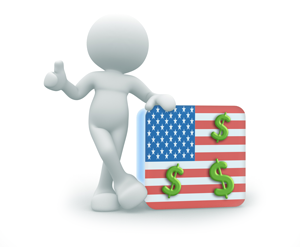U.S. savings accounts are running at negative interest rates, so in an effort to save money, you could be losing value and spending power.
January 24, 2018

Back when you were young that might have been a good idea. But times have certainly changed.
Once you discover the “Real” truth about your U.S. savings account, you might start to think you’re being scammed by your own bank. Here’s why…
Many U.S. banks pay an interest rate on savings of 0.01% – 0.05%. According to the FDIC, the national average of all insured banks is a meager 0.06%.[1]
That’s not even a tenth of a penny on every dollar you deposit.
But according to the U.S. Government’s “close enough” math, the inflation rate is 2.1% for the 12 months ending December 2017.[2]
Economists call the difference between the average interest rate and inflation your “Real” interest rate, adjusted for inflation[3]. Right now, that figure is negative.
So the money in your savings account is losing an average of 2.04% in purchasing power every year. Bottom line: If you have money in savings, you’re trapped into this “scam” of consistently losing purchasing power.
An example explained at Investopedia[4]:
Let’s say you have $100 in a savings account that pays a 1% interest rate. After a year, you will have $101 in your account. During this period, if inflation runs 2%, you would have to have $102 to make up for the impact of higher prices.
Since you will only have $101 in your account, you have actually lost some purchasing power. If your savings don’t grow to reflect this rise in prices over time, the effect will be as though you are actually losing money.
Unless you get your money off of this savings account “hamster wheel,” over time you’ll feel like you never “catch up” to the prices of goods and services.
In the 1980’s this got really bad in the U.S. Inflation soared and unemployment was high. But even if it doesn’t get that bad again, with this loss of purchasing power…
Groceries will be more expensive and routine expenses like car maintenance will take a bigger bite out of your paycheck.
But there is good news. Certain international banks pay up to 7% or more on U.S. dollar deposits[5].
To start taking advantage of this you need to get your money out of the U.S. banking system.
Which is why you should seriously consider opening an offshore bank account in as little as 10 minutes, and moving some of your money into it.
Offshore bank accounts give your money room for growth. By placing some of your wealth outside of U.S. banking system, you can grow your savings at a rate that gives you purchasing power, instead of taking it away.
You’re also putting it out of reach of greedy bankers who want to do nothing but take money out of your pocket and put it into theirs.
Opening an offshore bank account is actually quite simple, 100% legal, and one of the smartest financial moves you can make[6]. My special Offshore Banking Report shows you how.
When you get my Offshore Banking Report, you’ll discover 23 different offshore banks, FinTech platforms, and P2P lending platforms where you can quickly open accounts to protect your wealth from a centralized banking system that is killing your purchasing power.
This report is less than $20 right now…
Get your digital copy of the report right here
Live well,
Bobby Casey
Location Independent Entrepreneur
P.S. Inflation can mean higher cost of goods and services and much lower purchasing power. Just imagine how bad it will get if inflation returns to the 13% it was in 1980.[7] Get my special report today and learn how to protect yourself and grow your money instead.
[1] https://www.fdic.gov/regulations/resources/rates/#
[2] http://www.usinflationcalculator.com/inflation/current-inflation-rates/
[3] https://www.sovereignman.com/trends/finding-a-safe-bank-that-actually-pays-a-solid-interest-rate-21149/
[4] https://www.investopedia.com/articles/investing/090715/how-inflation-affects-your-cash-savings.asp
[5] https://www.sovereignman.com/trends/finding-a-safe-bank-that-actually-pays-a-solid-interest-rate-21149/
[6] https://www.sovereignman.com/offshore-bank-account/
[7] https://inflationdata.com/articles/inflation-cpi-consumer-price-index-1980-1989/

